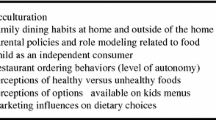Abstract
Previous research suggests a deleterious impact on dietary quality when people immigrate to the United States and that children influence immigrant parent’s decisions to serve traditional and/or non-traditional foods. Interviews (n = 75) were conducted with Hmong, Somali, and Latino parents of 5–7 year old children about the foods they serve to their children and how the child influences these food decisions. A racially/ethnically diverse team coded interviews using a mixed inductive/deductive approach. Most Latino and Somali parents reported serving mostly traditional foods at home. Regarding feeding decisions, parents reported: (1) allowing children non-traditional foods when requested; (2) “Americanizing” traditional foods; and (3) that children prefer traditional foods. Some Hmong parents reported serving their children non-traditional foods at meals while parents ate traditional foods. Results offer guidance to providers working with immigrant parents of young children regarding maintaining healthful diets when children request potentially unhealthy non-traditional foods.
Similar content being viewed by others
References
Franzen L, Smith C. Acculturation and environmental change impacts dietary habits among adult Hmong. Appetite. 2009;52:173–83.
Dharod JM, Croom J, Sady CG, Morrell D. Dietary intake, food security, and acculturation among somali refugees in the United States: results of a pilot study. J Immigr Refug Stud. 2011;9:82–97.
Sussner KM, Lindsay AC, Greaney ML, Peterson KE. The influence of immigrant status and acculturation on the development of overweight in latino families: a qualitative study. J Immigr Minor Heal. 2008;10:497–505.
Ayala GX, Baquero B, Klinger S. A systematic review of the relationship between acculturation and diet among Latinos in the United States: implications for future research. J Am Diet Assoc. 2008;108:1330–444.
Pan YL, Dixon Z, Himburg S, Huffman F. Asian students change their eating patterns after living in the United States. J Am Diet Assoc. 1999;99:54–7.
Roche A, Goto K, Zhao Y, Wolff C. Research brief bonding and bridging social and cultural capitals: perceived factors associated with family eating practices among Hmong, Latino, and white mothers and fathers. J Nutr Educ Behav [Internet]. 47:540–547.e1. https://ac.els-cdn.com/S1499404615006600/1-s2.0-S1499404615006600-main.pdf?_tid=86d57b94-d39f-11e7-8f90-00000aab0f6b&acdnat=1511806958_2c67218214e5f011845ebc2a96e455ca (2015). Accessed 27 Nov 2017
Soto SH, Arredondo EM, Marcus B, Shakya HB, Roesch S, Ayala GX. Effects of Latino children on their mothers’ dietary intake and dietary behaviors: the role of children’s acculturation and the mother-child acculturation gap. Soc Sci Med. 2017;191:125–33. https://doi.org/10.1016/j.socscimed.2017.09.004.
Wang Y, Beydoun MA. The obesity epidemic in the United States - Gender, age, socioeconomic, racial/ethnic, and geographic characteristics: a systematic review and meta-regression analysis. Epidemiol Rev. 2007;29:6–28.
New Census Bureau Report Analyzes U.S. Population Projections [Internet]. United States Census Bur. https://www.census.gov/newsroom/press-releases/2015/cb15-tps16.html (2015). Accessed 20 Jun 2017
United States Census Bureau. Quick Facts: United States [Internet]. https://www.census.gov/quickfacts/fact/table/US/PST045216. Accessed 9 Aug 2017
Pfeifer M, Sullivan J, Yang K, Yang W. Hmong population and demographic trends in the 2010 Census and 2010 American Communtiy Survey. Hmong Stud J. 2012;13:1–31.
Darboe K. New immigrants in Minnesota: The Somali immigration and assimilation. J Dev Soc [Internet]. 2003;19:458–72. https://www.scopus.com/inward/record.url?eid=2-s2.0-33751300452&partnerID=40&md5=0b15eaccbc54129766a4a637e8007887
Berge JM, Trofholz AC, Tate AD, Beebe M, Fertig A, Miner MH, et al. Examining unanswered questions about the home environment and childhood obesity disparities using an incremental, mixed-methods longitudinal study design: protocol for the family matters study. Contemp Clin Trials. 2017;62:61–766.
Crabtree BF, Miller WL. Doing qualitative research, vol. 3. Newbury Park, CA: Sage Publications; 1992.
Elo S, Kyngäs H. The qualitative content analysis process. J Adv Nurs. 2008;62:107–15.
Arcan C, Culhane-Pera KA, Pergament S, Rosas-Lee M, Xiong MB. Somali, Latino and Hmong parents’ perceptions and approaches about raising healthy-weight children: a community-based participatory research study. Public Health Nutr. 2018;21:1079–93.
Fertig AR, Loth KA, Trofholz AC, Tate AD, Miner M, Neumark-Sztainer D, Berge JM. Compared to pre-prepared meals, fully and partly home-cooked meals in diverse families with young children are more likely to include nutritious ingredients. J Acad Nutr Diet. 2019;119(5), 818–30.
Burns C. Effect of migration on food habits of Somali women living as refugees in Australia. Ecol Food Nutr. 2004. https://doi.org/10.1080/03670240490447541.
Acknowledgements
The Family Matters study was a team effort and could not have been accomplished without the dedicated staff who drove throughout the Twin Cities to connect with participants in their homes. For their hard work, the authors would like to thank: Awo Ahmed, Nimo Ahmed, Rodolfo Batres, Carlos Chavez, Mia Donley, Michelle Draxten, Sulekha Ibrahim, Walter Novillo, Alejandra Ochoa, Luis “Marty” Ortega, Anna Schulte, Hiba Sharif, Mai See Thao, Rebecca Tran, Bai Vue, and Serena Xiong.
Funding
Research is supported by Grant Number R01HL126171 from the National Heart, Lung, and Blood Institute (PI: Berge). The content is solely the responsibility of the authors and does not necessarily represent the official views of the National Heart, Lung and Blood Institute, the National Institute of Child Health and Human Development or the National Institutes of Health.
Author information
Authors and Affiliations
Corresponding author
Ethics declarations
Conflict of interest
The authors declare that they have no conflicts of interest to report.
Research Involving Human Participants and/or Animals
All procedures performed in studies involving human participants were in accordance with the ethical standards of the University of Minnesota’s Institutional Review Board (#1107S02666) and with the 1964 Helsinki declaration and its later amendments.
Informed Consent
Informed consent was obtained from all individual participants included in the study.
Additional information
Publisher's Note
Springer Nature remains neutral with regard to jurisdictional claims in published maps and institutional affiliations.
Rights and permissions
About this article
Cite this article
Trofholz, A., Richardson, K., Mohamed, N. et al. How a Racially/Ethnically Diverse and Immigrant Sample Qualitatively Describes the Role of Traditional and Non-traditional Foods in Feeding Their Children. J Immigrant Minority Health 22, 1155–1162 (2020). https://doi.org/10.1007/s10903-020-00999-3
Published:
Issue Date:
DOI: https://doi.org/10.1007/s10903-020-00999-3



